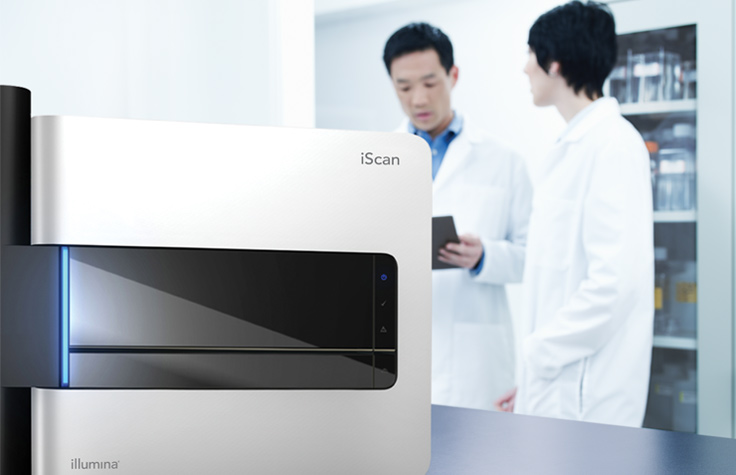Scaling a Genetic Testing Laboratory to Genotype Thousands of Samples
Introduction
GPBio was the only Asian company among the 12 global consortium members involved in developing the Infinium Global Screening Array (GSA). With the GSA as its genotyping platform, the company performs testing services for leading hospitals, research institutes, and universities in China. In less than two years, GPBio outgrew its 500 m2 laboratory space.
Understanding that its testing volumes would continue to increase, the GPBio management team began planning a move into a 5000 m2 facility. They realized that building a scalable genotyping capability would require more than just a bigger building. The team needed experienced guidance about how to increase the lab’s throughput, streamline its genotyping workflows, and manage samples efficiently to support future testing growth.
Working with the Illumina ArrayLab Consulting Service, GPBio developed a plan to maximize the lab’s setup and operation. In addition to determining staffing and resource requirements, they instituted a more efficient sample workflow and optimized data reporting procedures to support a scalable high-throughput genotyping laboratory.
iCommunity spoke with Yuqing Zhang, Vice President of Operations at GPBio, about the laboratory planning and development process, and the benefits GPBio gained from working with the ArrayLab Consulting Service.
GPBio provides genotyping testing services to leading hospitals, research institutes, and universities in China.
Q: What services does GPBio provide and who are its customers?
Yuqing Zhang (YZ): GPBio was founded in 2016 and provides genetic testing services for hospitals and research facilities in China. We offer genetic tests based on advanced microarrays and sequencing technologies, and are building the largest human genomic database. In addition to the Chinese Academy of Sciences, GPBio customers include Fudan University and its affiliates, Huashan Hospital and the Shanghai Eye and ENT Hospital.
Q: When did you join the company?
YZ: I joined the company in April 2017 as Vice President, Operations. I was familiar with microarray-based genotyping technologies. When I joined the company, we were transitioning from a small laboratory to one that was 10× larger.
Q: Why did you select the ArrayLab Consulting Service to help with the setup of the new laboratory facility?
YZ: The move to a larger lab presented several challenges, especially in creating an efficient workflow for processing a larger number of samples. We needed guidance on how to process samples as they came into the lab. We also wanted to incorporate robots into the workflow to handle sample preparation. The question was how to integrate everything into our new lab.
"The ArrayLab Consulting team made my job easier by handling the planning of our new genotyping facility. It enabled me to focus on the day-to-day operation of our existing facility."
Q: What guidance did the ArrayLab Consulting Service provide as your setup the laboratory?
YZ: When the lab building was completed, the ArrayLab Consulting team obtained the dimensions, developed a suggested layout, and presented it to us. They came back in as we were setting up everything.
Over several weeks, they answered our questions and guided us about how to use the lab space efficiently and optimize inventory management successfully. To increase sample throughput, they recommended automating part of the sample workflow with a Tecan liquid handler. The team assisted us as we integrated the equipment into a streamlined workflow. They also guided us on how to perform data reporting efficiently.
Q: What benefits did you gain from partnering with the ArrayLab Consulting Service?
YZ: Our lab was up and running quickly. The ArrayLab Consulting team made my job easier by handling the planning of our new genotyping facility. It enabled me to focus on the day-to-day operation of our existing facility.
I think it is impressive that Illumina has a consulting service to help its array customers set up their genotyping labs and operate them efficiently. We benefited from their guidance before, during, and after the lab was completed in Q3 2017.
Q: What types of tests does GPBio offer?
YZ: We offer neonatal screening, childhood disease and metabolic disorder risk tests, as well as adult tests for cardiovascular disease, cancer, drug response, metabolic disease, allergies, and health management. All of these tests are currently performed using the GSA.
Q: How is the GSA performing?
YZ: We’re happy with the call rate and data quality of the GSA. Our customers are pleased with the genotyping data that we’re providing.
" We’re working with the ArrayLab Consulting team to evaluate different scenarios to increase our throughput to > 1000 samples/week."
Q: How many samples do you process per week?
YZ: We’re processing 1000 samples per week, with a turnaround time of one week.
Q: What is your throughput goal this year?
YZ: Our current laboratory setup supports up to 1000 samples/week, so we’ll be building up to that this year. We have one iScan System, one Tecan, and a fully dedicated group to process and run samples.
Q: What are the next steps for GPBio in serving its customers?
YZ: We’re working with the ArrayLab Consulting team to evaluate different scenarios to increase our throughput to > 1000 samples/week. By the end of 2018, we hope to have processed 100,000 samples.
We’ve also worked closely with Illumina on the development of the Asian Genome Array (ASA) and are in the process of switching over to it. The ArrayLab consulting team has assisted us in developing customized ASA chips to meet our testing needs. We’re looking forward to offering them.
Learn more about the products and services mentioned in this article:
Infinium Global Screening Array, www.illumina.com/products/by-type/microarray-kits/infinium-global-screening.html.
Asian Screening Array (ASA), www.illumina.com/products/by-type/microarray-kits/infinium-asian-screening.html
iScan System, www.illumina.com/systems/array-scanners/iscan.html
